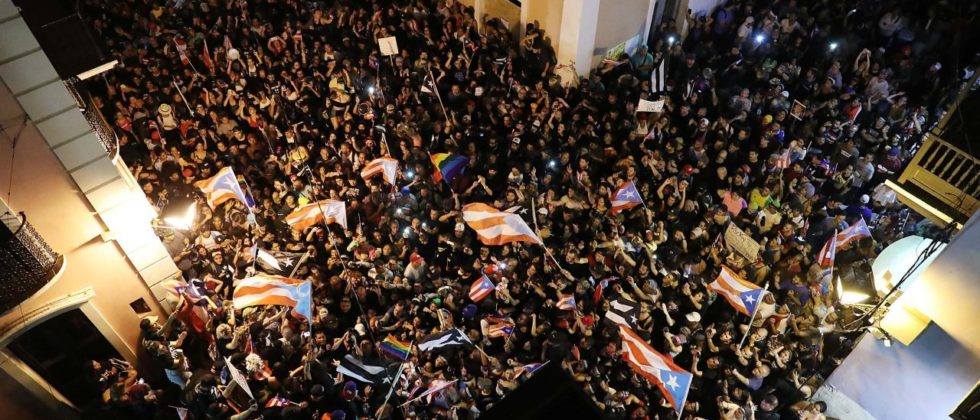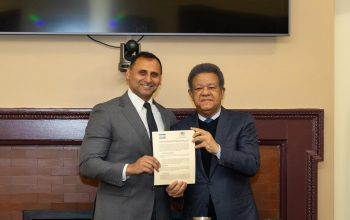news
“Puerto Rico: The FRAGILITY OF POWER”, an article by Dr. Leonel Fernández
August 9, 2019
Just a month ago no one would have imagined that Ricardo Rosselló, who was preparing for his reelection in 2020, would stop being the governor of Puerto Rico.
As of last Saturday [at the time of writing], the governor has been Pedro Pierluisi, the former resident commissioner in Washington, D.C., brought out of his ostracization to occupy the position.
But the legal controversy that has been sparked around his nomination throws into relief the magnitude of the political crisis that is currently shaking the Boricuan island.
In principle, it did not fall to Pedro Pierluisi to be the successor of Rosselló. That role, in line with the constitution of Puerto Rico, corresponded to the secretary of state.
It happened, however, that the secretary of state, Luis Rivera Marín, resigned from his post even before Governor Rosselló himself did.
In the absence of the secretary of state, then, next in the line of succession was the justice secretary, Wanda Vázquez. But she—because of questions surrounding her performance in that office—in a typical case of tragicomedy, expressed a lack of interest in the much-desired governorship.
The third in line to access the highest office of Puerto Rico’s public administration is the secretary of finance, Francisco Parés.
Nonetheless, with Parés the unexpected happened: he is not old enough to occupy the office. The constitution sets a requirement that the governor should be at least 35 years old. Secretary Parés is just 31. It was this that resulted in Pedro Pierluisi being catapulted onto the scene, although to take the oath of office as governor, he had first to be sworn in as secretary of state.
This was done. Governor Rosselló nominated him to that position. The House of Representatives confirmed him. But not the Senate, which declared that today, Monday, it would consider his nomination and put it to a vote.
That, of course, raises the legal argument of whether a secretary of state, without being confirmed by both chambers, has the legal capacity to be designated as governor with the aim of replacing Ricardo Rosselló.
In short, Puerto Rico is starting the week with a governor in his labyrinth.
The chat that shook Borinquen
The political earthquake that turned Puerto Rican society upside down for nearly two weeks had an unexpected origin. An ex-secretary—it is rumored—upset at being unexpectedly fired, leaked nearly 900 pages of chats carried out over the messaging app Telegram.
Participants in these chats included Governor Rosselló, several members of his cabinet, advisors, and connections. Pejorative expressions were used and political leaders, artists, community leaders, people with disabilities, and even victims of the natural disasters that impacted the island two years ago were ridiculed.
No one escaped the mockery, sarcasm, and insults. This resulted in widespread indignation. There was an outcry across literally almost the whole of Puerto Rico. Tens of thousands of people took to the streets with a single slogan: Ricky Renuncia Ya—“Ricky Resign Now”.
Prominent names in the arts such as René Pérez (Residente), Bad Bunny, Ricky Martin, Daddy Yankee, and Wisin fully deployed their power to bring people out to mobilize broad sectors of society. They did it to the rhythm of reggaetón, harmonizing with an infectious piece that was just right for the moment: Afilando Cuchillos (“Sharpening Knives”). Despite the tumult that was repeated every night and the waves of protestors that poured into the streets, governor Rosselló initially resisted the demand of the protestors.
He announced that he would not resign. But, in the face of the continued pressure, he decided to declare that he would not seek reelection in the 2020 election.
Nonetheless, the political climate grew ever darker. He had to present his resignation as president of the New Progressive Party (PNP); and an impeachment process began to incubate among his opponents, both internal and external, in the House of Representatives.
In the end, Governor Rosselló couldn’t resist the siege to which he was implacably subjected. He realized that power has its limits; that in the current moment it’s very fragile; that even jokes can spark indignation and make the structures of power crumble; and that, in short, it is always the people who rule.
And so he resigned.
Background causes
Naturally, it wasn’t just the episode of the leaked chat messages that sparked the ire of Puerto Rican society. Two weeks prior, several ex civil servants had been arrested by the FBI in an investigation of alleged irregularities committed in the exercise of their duties.
On top of this situation of lack of transparency on the part of civil servants was the anguish and suffering experienced by many people as a result of hurricanes Irma and Maria two years ago.
These natural disasters threw into relief the deficiencies and structural weaknesses of Puerto Rican society. Despite the authorities initially declaring the deaths of 64 people, a later study by Harvard University verified that this figure had in fact been higher than 4,000 victims.
This obviously stirred anger and irritation in Puerto Rican society. It highlighted the incompetence, insensitivity, and even lack of solidarity of the government, which in the view of the citizenry showed no respect even for Puerto Rico’s dead.
For nearly a year, many homes lacked electricity, access to potable water, and other basic services. Several highways remain unrepaired, bridges collapsed, school buildings unrehabilitated, and hospitals lacking adequate services.
But in reality, since nearly 15 years ago, Puerto Rico has been in a permanent state of economic crisis. Faced with a public debt of $70 billion, Puerto Rico defaulted.
In response, in 2015 the United States Congress approved a law called PROMESA, in virtue of which a Board of Fiscal Supervision was named and given practically absolute control of the entire administrative-financial system of the Commonwealth of Puerto Rico.
It set the budget; ordered the application of austerity policies; decided to cut the pensions of the more than 500,000 retired public servants; eliminated the Christmas bonus; and ordered the firing of more than 50,000 state employees.
Since then, the Puerto Rican economy has been stagnant. Unemployment has been increasing and the population shrinking every year. Thousands of people have abandoned the island in the last decade. The exodus continues relentlessly. Today some 3,200,000 Puerto Ricans live on the island, while 5,500,000 live in the United States.
The crisis, thus, goes a long way back. All that was needed was a spark to set the island alight. It came in the form of jokes in poor taste that inflamed the people, put an end to a government, and made the fragility of power crystal clear.






